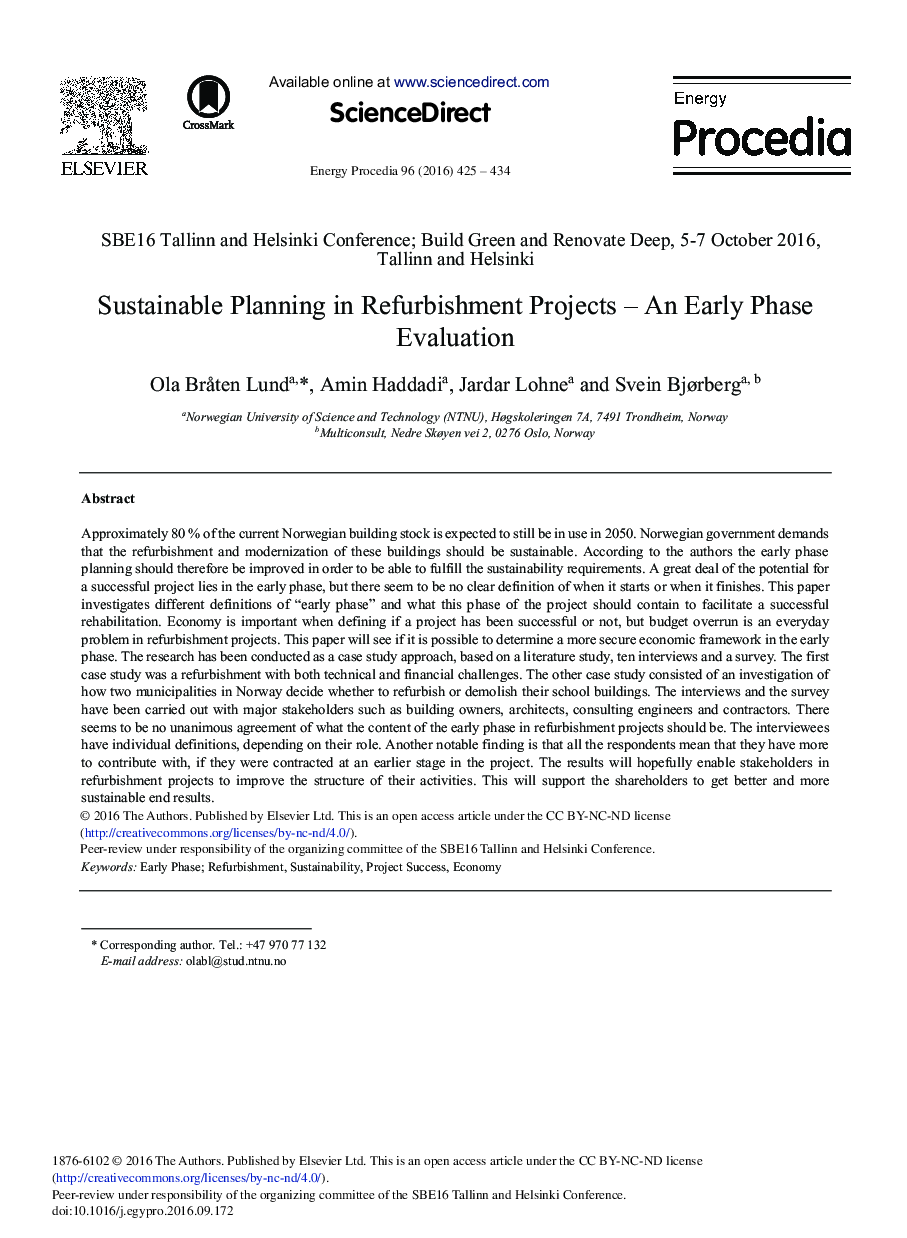| کد مقاله | کد نشریه | سال انتشار | مقاله انگلیسی | نسخه تمام متن |
|---|---|---|---|---|
| 5446738 | 1511139 | 2016 | 10 صفحه PDF | دانلود رایگان |
عنوان انگلیسی مقاله ISI
Sustainable Planning in Refurbishment Projects - An Early Phase Evaluation
ترجمه فارسی عنوان
برنامه ریزی پایدار در پروژه های بازسازی - ارزیابی فاز اولیه
دانلود مقاله + سفارش ترجمه
دانلود مقاله ISI انگلیسی
رایگان برای ایرانیان
کلمات کلیدی
فاز اولیه، بازسازی، پایداری، موفقیت پروژه، اقتصاد
ترجمه چکیده
انتظار می رود تقریبا 80 درصد از سهام فعلی نروژی در سال 2050 همچنان مورد استفاده قرار گیرد. دولت نروژی خواستار بازسازی و نوسازی این ساختمان ها باید پایدار باشد. به گفته نویسندگان، برنامه ریزی فاز اولیه باید به منظور تطابق با الزامات پایداری بهبود یابد. مقدار زیادی از پتانسیل برای یک پروژه موفق در مرحله اولیه قرار دارد، اما به نظر می رسد که تعریف دقیق از زمان شروع و یا زمانی که آن را به اتمام است. در این مقاله تعاریف متفاوتی از مرحله اول زودتر بررسی شده است. و چه مرحله ای از این پروژه باید برای تسهیل توانبخشی موفق باشد. اقتصاد در تعیین اینکه آیا یک پروژه موفق بوده یا خیر، مهم است، اما بازنشستگی بودجه یک مشکل روزمره در پروژه های بازسازی است. در این مقاله، اگر امکان تعیین چارچوب اقتصادی بیشتر در فاز اولیه وجود داشته باشد، می توان آن را بررسی کرد. این پژوهش به عنوان یک رویکرد مطالعه موردی، بر اساس یک مطالعه ادبی، ده مصاحبه و یک نظرسنجی انجام شده است. اولین مطالعه موردی، بازسازی با چالش های فنی و مالی بود. مطالعه موردی دیگر شامل تحقیق درباره اینکه چگونه دو شهرداری در نروژ تصمیم می گیرند که آیا ساختمان های مدرسه را احیا کنند یا تخریب کنند. مصاحبه ها و نظرسنجی با ذینفعان اصلی مانند صاحبان ساختمان ها، معماران، مهندسان مشاور و پیمانکاران انجام شده است. به نظر می رسد هیچ توافق یکنواختی در مورد محتوای فاز اولیه در پروژه های بازسازی وجود ندارد. مصاحبه شوندگان با توجه به نقش خود تعاریف فردی دارند. یکی دیگر از یافته های قابل توجه این است که همه پاسخ دهندگان به این معنی است که آنها با مشارکت بیشتر، اگر در یک مرحله اولیه در این پروژه قرارداد متعهد شده اند، بیشتر به آن کمک کنند. نتایج امیدوارم ذینفعان را در پروژه های بازسازی فعال سازد تا ساختار فعالیت هایشان بهبود یابد. این از سهامداران برای به دست آوردن نتایج پایدارتر و پایدارتر حمایت خواهد کرد.
موضوعات مرتبط
مهندسی و علوم پایه
مهندسی انرژی
انرژی (عمومی)
چکیده انگلیسی
Approximately 80% of the current Norwegian building stock is expected to still be in use in 2050. Norwegian government demands that the refurbishment and modernization of these buildings should be sustainable. According to the authors the early phase planning should therefore be improved in order to be able to fulfill the sustainability requirements. A great deal of the potential for a successful project lies in the early phase, but there seem to be no clear definition of when it starts or when it finishes. This paper investigates different definitions of “early phase” and what this phase of the project should contain to facilitate a successful rehabilitation. Economy is important when defining if a project has been successful or not, but budget overrun is an everyday problem in refurbishment projects. This paper will see if it is possible to determine a more secure economic framework in the early phase. The research has been conducted as a case study approach, based on a literature study, ten interviews and a survey. The first case study was a refurbishment with both technical and financial challenges. The other case study consisted of an investigation of how two municipalities in Norway decide whether to refurbish or demolish their school buildings. The interviews and the survey have been carried out with major stakeholders such as building owners, architects, consulting engineers and contractors. There seems to be no unanimous agreement of what the content of the early phase in refurbishment projects should be. The interviewees have individual definitions, depending on their role. Another notable finding is that all the respondents mean that they have more to contribute with, if they were contracted at an earlier stage in the project. The results will hopefully enable stakeholders in refurbishment projects to improve the structure of their activities. This will support the shareholders to get better and more sustainable end results.
ناشر
Database: Elsevier - ScienceDirect (ساینس دایرکت)
Journal: Energy Procedia - Volume 96, September 2016, Pages 425-434
Journal: Energy Procedia - Volume 96, September 2016, Pages 425-434
نویسندگان
Ola Bråten Lund, Amin Haddadi, Jardar Lohne, Svein Bjørberg,
